Spring School in Quantitative Methods
The Spring School in Quantitative Methods 2015 was hosted by the Faculty of Business, Economics and Social Sciences of the University of Hohenheim between 27.-29.05.2015. The 26 participants had the opportunity to explore effective programming for economists. The Spring School addressed the needs of doctoral students and postdocs who intended to strengthen their methodical skills, discussed current research projects and discovered new ways to investigate their problems at hand. In 2015 the Spring School was sponsored by the Hohenheim Management School.
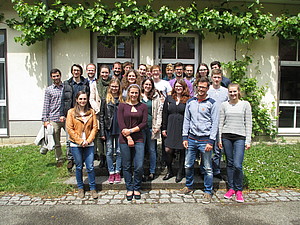
The Spring School in Quantitative Methods 2016 was hosted by the Faculty of Business, Economics and Social Sciences of the University of Hohenheim. Professor Hoderlein (Boston College, USA) started with a recap of the fundamental concepts of nonparametrics from a kernel perspective, density estimation and mean regression estimation. The course proceeded with an application of these methods to binary choice models and finally ended with an overview on nonparametric modelling of unobserved heterogeneity. While the morning classes covered the econometric theory, the students could directly apply the learned methods in the R-practicals in the afternoon. In addition, two doctoral students had the opportunity to present and discuss their current research at the end of each day. Lunch time at the Denkbar and coffee breaks further encouraged informal discussions among the young scholars. In 2016 the Spring School was sponsored by the Hohenheim Management School.
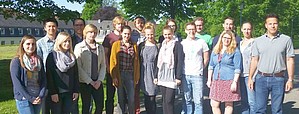
The topic of the Spring School in Quantitative Methods 2017 was “Quantitative Text Analysis” and was hosted by the Faculty of Business, Economics and Social Sciences of the University of Hohenheim. The lecturer of the three-day course was Prof. Kenneth Benoit from the London School of Economics, an expert for quantitative social research methods.
Throughout the course Prof. Benoit demonstrated the possibilities of text manipulation and text analysis using the statistical program R with the help of the software package “Quanteda”, specifically designed by Benoit et al. for text based analysis. He presented how to prepare data to fit the needs of the researchers. This included combining and separating text-files, using dictionaries, checking indicators for readability and lexical diversity, and generating graphs like word clouds.
Prof. Benoit strongly encouraged active participation and adapted his schedule on the fly to provide the opportunity for answering individual questions using examples. Students were encouraged to bring their own texts to be analyzed by Prof. Benoit in front of the class. The list of texts presented included inauguration speeches of American presidents, twitter feeds, and song texts.
The participating doctoral students came from Tübingen and Hohenheim and even from Berlin, Mannheim, and Münster and their research fields included psychology and economics, as well as communication sciences. This heterogeneous background made for interesting discussions, which were further encouraged by collective lunch and coffee breaks.
by Jonas Frank
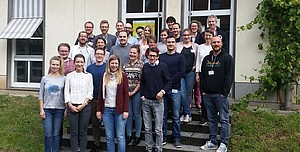
The topic of the Spring School in Quantitative Methods 2018 was “Workflow of Statistical Data Analysis” and was hosted by the Faculty of Business, Economics and Social Sciences of the University of Hohenheim. The lecturers of the three-day course were Dr. Karsten Schweikert from the Core Facility Hohenheim and Prof. Oliver Kirchkamp from the University of Jena. The objective of the course was to learn techniques that facilitate the organisation of empirical research using the software R. In particular to organise and analyse data in a way such that the results can be replicated easily, i.e. to organise the statistical workflow in a less error-prone and more efficient way. Therefore, the tree-day session started with an R-Tutorial taught by Dr. Schweikert. Building on the R-tutorial Prof. Kirchkamp showed first how to prepare and work with the data and second how to interweave the latex code and the R code for the presentation of the results. Finally he introduced the version control software Git to make every step trackable and to facilitate our own and the workflow in teams. Prof. Kirchkamp strongly encouraged active participation and adapted his schedule on the fly to provide the opportunity for answering individual questions as well as to include examples to apply the techniques he introduced before. The participating doctoral students came from Tübingen and Hohenheim and their research fields included economics as well as agricultural and communication science. This heterogeneous background allowed for interesting discussions, which were further encouraged by collective lunch and coffee breaks with pretzel and pastry.
by Markus Mößler
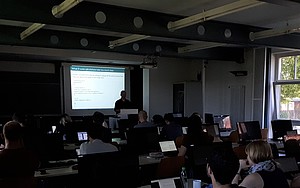
The Spring School in Quantitative Methods 2019, hosted by the Faculty of Business, Economics and Social Sciences of the University of Hohenheim, addressed the topic “Text Mining using R”. The lecturer of the three-day course was Dr. Gregor Wiedemann from Hamburg University. Additionally, Dr. Karsten Schweikert from the Core Facility Hohenheim offered an optional introduction course to the statistical software package R prior to the Spring School.
Throughout the Spring School Dr. Wiedemann demonstrated various examples of text manipulation and text analysis using the statistical program R. He presented how to prepare data and adapt it to the different research areas. This included pre-processing of textual data, crawling and web scraping, frequency analysis, keyterm analysis, co-occurrence and topic models. Also techniques to visualize results, like distribution graphs, wordclouds or networks were shown. Lecture sessions alternated with very well prepared tutorial sessions. Active participation was strongly encouraged and there was plenty of scope for discussions. The tutorials were structured in a way that beginners in R could follow the steps easily and at the same time, more advanced users had the possibility to broaden their knowledge through optional exercises or alterations.
Dr. Wiedemann showed very well how these methods could be applied to different research questions in different fields. Participants with a specific project in mind had the chance to ask for modifications for their particular application.
The different backgrounds of the participants fostered interesting discussions and encouraged to think outside the box. Room for conversation and networking was given throughout the lunch and coffee breaks.
by Heike Trastl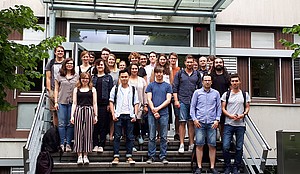
The Spring School in Quantitative Methods 2020, hosted by the Faculty of Business, Economics and Social Sciences of the University of Hohenheim, is scheduled for June 2-5, 2020. This year’s topic will be “Social Network Analysis”.
Further information on lecturer(s) and application procedure of the Spring School 2020 will be available soon here.
